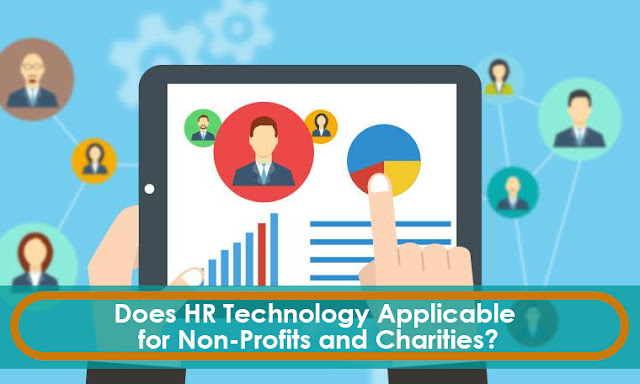Does HR Technology Applicable for Non-Profits and Charities?
It is essential for non-profits
and charities to realize their vision while maintaining internal and on-ground
efficiency. HR tech can play a significant role in helping them achieve this level
of efficiency.
Nowadays, organizations across
segments and verticals are embracing HR technology like never before. It helps
to optimize processes, automate iterative HR admin tasks, gauge employee
sentiment, and foster an engaging and meaningful work culture.
Research suggests that charities
and non-profit organizations might not be up to speed when it comes to
modernizing HR admin tasks. For instance, Charity Digital’s Annual White Paper
report indicated that 40% of the charities surveyed believed their trustee’s IT
capabilities to be “below par” – up from last year's 29%. Further, today
charity trustees are more vocal about this gap, with 33% admitting that their
IT competence is below average (against 20% last year).
Clearly, there is a critical need
for non-profits and charities to look at tech platforms for HR admin tasks and
partner with cutting-edge solution providers to address this gap. We spoke with
Jonathan Richards, Founder, and CEO of Breathe, to understand how HR tech could
play a role in transforming how charities operate and pave the way for
operational efficiency.
Right on top of any daily HR
admin task schedule is the collection and management of data. Typically,
charities have reams of incoming data, spread across donors, volunteers, target
groups, and several other stakeholders. A cutting-edge, integrated data
management system could transform, assess, and evaluate data, helping these
teams gain new insights and even maintain compliance.
Some key impact area of HR tech
is that charities can now automate repetitive HR admin tasks, freeing up
resources for more valuable activities. And this would also help in optimizing
in-house expense management – which is critical to the survival and success of
a charity.
Now that we’ve established why
even a non-profit company needs to digitize HR admin tasks, let’s discuss three
key benefits/impacts of HR tech adoption.
HR tech is among the cogs in this
process of standardization. Here are three clear benefits:
1. You can reduce time spent
on HR admin tasks
The writing is on the wall: as
you automate daily activities, your HR team can focus on the things that matter
the most.
“Free HR people from this and
they can focus on other areas such as strategic vision, business development,
and fostering a positive company culture, which brings out the best in a
charity’s employees and volunteers. This is essential for retaining people and
effective recruitment,” (Richard,2019)
Richards said “going digital
means HR people can dedicate their time to developing their colleagues and
helping them grow.”
2. You can ensure data is
secure, compliant, and impenetrable
Legacy systems of data management
and multiple spreadsheets will always expose you to data theft. This is why
charities must stay one step ahead of a possible breach, investing in a
centralized data repository.
Richards opined, “Look for a
system for which every employee within an organization has their own unique
log-in. The ability to set different access and user permissions is just as
vital. This ensures that people can only see what they are meant to see, and
that HR administrators have complete control over which documents and
information are visible to people.”
3. You can manage costs better
by moving to the cloud
If you’re still considering
staying on-premise with your IT infrastructure, you will have to:
Incur constant
maintenance and support costs
Address the ever-increasing
possibility of a data breach
But by moving to an on-cloud HR
data solution, you can ensure data safety as well as cost-effectiveness.
Reinforcing the Case for HR
Tech Adoption
Interestingly, it isn’t that
charities are tech-averse. In fact, several non-profits use state-of-the-art
solutions in areas like productivity, finance, and customer relationship
management (CRM). However, HR tech remains untapped.
A cloud-based tech solution could
transform HR productivity levels and reduce manual intervention by up to 80%.
For charities, it’s important to
reach their targets but also stay true to the mission and values that birthed
them. At the same time, it is important to apply the fundamentals of any
operational business enterprise to ensure their viability in the long term.
In conclusion, it all comes down to
this. Everyday issues and the absence of essential operational efficiency
should not shift your focus from the vision of your charity. By offloading HR
admin tasks to HR technology, you can ensure that you can devote more time to
your vision and accomplish it.




Comments
Post a Comment